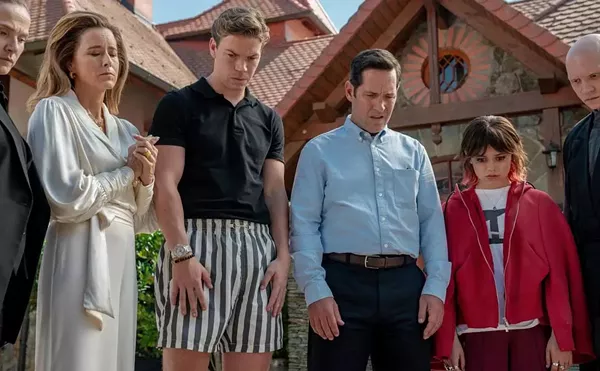Francis Ford Coppola: A Filmmaker's Life
by Michael Schumacher
Crown, 536 pages, $30.
The pivotal moment of Michael Schumacher's biography of director Francis Ford Coppola takes place in the fall of 1975. Frustrated by his inability to cast actors for his dream project — an adaptation of Joseph Conrad'sHeart of Darkness, destined to become the expensive, tortured 1979 Vietnam epic Apocalypse Now — Coppola hurls his five Oscars out of the window of his San Francisco estate, smashing them to bits.
It isn't the only time Coppola boils over in Schumacher's overtly sympathetic book, but it's his most symbolic tantrum, a self-destructive expression of Coppola's belief that his early successes have imprisoned him in a myth and prevented him from realizing his true self as an artist—a maker of personal indie films. Yet as you page through the chapters of Francis Ford Coppola, you begin to agree not with the filmmaker's self-assessment but with a Newsweek review of Godfather III that Schumacher quotes: "The fear and terror that bedevil Coppola on his globe-trotting, money-gobbling, deadline-crushing Godfathering may really be the fear that this is his true work, work he has been dragooned, cajoled, and forced into by the failure of his more cherished projects."
Coppola's myth was built in the 1970s upon a pair of epic masterpieces—the first two Godfathers, both of which he was dragged into kicking and screaming—and two-thirds of another, Apocalypse Now. His subsequent movies are either pleasantly slight or plain awful. Schumacher offers plenty of evidence why a filmmaker of Coppola's gifts hasn't managed to pull together a stronger résumé—bad business sense, lack of discipline, flamboyant pretentiousness—but the biographer jumps to his subject's defense too quickly, and too often. (Though Schumacher's book is not officially authorized, Coppola and many of his family members and associates cooperated.) The author sensitively reminds readers that the 1986 death of Coppola's eldest son took the wind out of his sails, perhaps for good. But Schumacher treads far too easily when criticism could be made on firmer grounds, especially with regards to Coppola's career-long problems of hubris and naiveté (much of his bad press can be traced back to his own big mouth), his disdain for labor unions, and his flagrant nepotism. (About which, Schumacher offers up this ruefully funny recollection from Coppola's daughter, Sofia, about how her father drafted her to play Michael Corleone's daughter, Mary, in Godfather III while she was visiting her parents in Rome on a break from college: "And my mom hung up and said, 'Okay, Sofia, we've got to go to Cinecittà right away. You're going to be Mary.' I was like, 'Excuse me? Are you sure? I just want to take a shower.'")
In the past two decades several film auteurs have shuttled easily between the studio and indie worlds, with more consistent artistic success and far less public huffing and puffing than Coppola. The central failure of Schumacher's book is that he essentially ignores these developments and their relationship to his subject's life and career. Peter Biskind's tougher 1998 bio of '70s film mavericks, Easy Riders, Raging Bulls, paints a more critical portrait of Coppola, and trumps Schumacher's book as well in its wide-screen perspective of the film industry Coppola and his peers came up in, and the one they helped create.
Heather Joslyn is the managing editor/arts editor for City Paper, where this feature first appeared. Send comments to [email protected]




